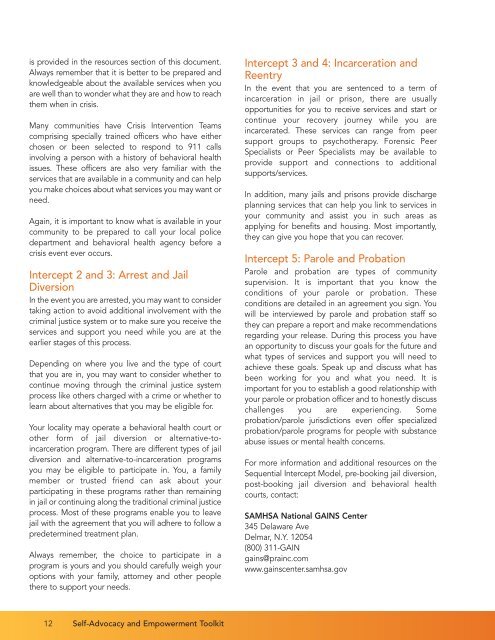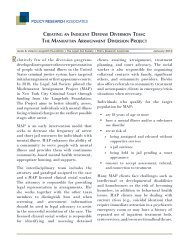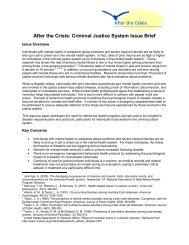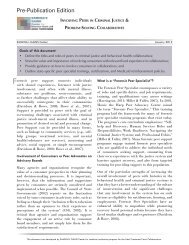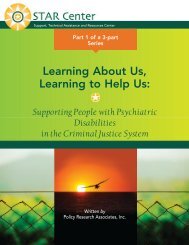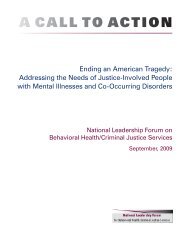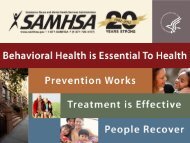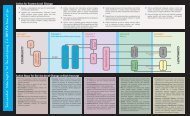Self-Advocacy and Empowerment Toolkit - STAR Center
Self-Advocacy and Empowerment Toolkit - STAR Center
Self-Advocacy and Empowerment Toolkit - STAR Center
Create successful ePaper yourself
Turn your PDF publications into a flip-book with our unique Google optimized e-Paper software.
is provided in the resources section of this document.<br />
Always remember that it is better to be prepared <strong>and</strong><br />
knowledgeable about the available services when you<br />
are well than to wonder what they are <strong>and</strong> how to reach<br />
them when in crisis.<br />
Many communities have Crisis Intervention Teams<br />
comprising specially trained officers who have either<br />
chosen or been selected to respond to 911 calls<br />
involving a person with a history of behavioral health<br />
issues. These officers are also very familiar with the<br />
services that are available in a community <strong>and</strong> can help<br />
you make choices about what services you may want or<br />
need.<br />
Again, it is important to know what is available in your<br />
community to be prepared to call your local police<br />
department <strong>and</strong> behavioral health agency before a<br />
crisis event ever occurs.<br />
Intercept 2 <strong>and</strong> 3: Arrest <strong>and</strong> Jail<br />
Diversion<br />
In the event you are arrested, you may want to consider<br />
taking action to avoid additional involvement with the<br />
criminal justice system or to make sure you receive the<br />
services <strong>and</strong> support you need while you are at the<br />
earlier stages of this process.<br />
Depending on where you live <strong>and</strong> the type of court<br />
that you are in, you may want to consider whether to<br />
continue moving through the criminal justice system<br />
process like others charged with a crime or whether to<br />
learn about alternatives that you may be eligible for.<br />
Your locality may operate a behavioral health court or<br />
other form of jail diversion or alternative-toincarceration<br />
program. There are different types of jail<br />
diversion <strong>and</strong> alternative-to-incarceration programs<br />
you may be eligible to participate in. You, a family<br />
member or trusted friend can ask about your<br />
participating in these programs rather than remaining<br />
in jail or continuing along the traditional criminal justice<br />
process. Most of these programs enable you to leave<br />
jail with the agreement that you will adhere to follow a<br />
predetermined treatment plan.<br />
Always remember, the choice to participate in a<br />
program is yours <strong>and</strong> you should carefully weigh your<br />
options with your family, attorney <strong>and</strong> other people<br />
there to support your needs.<br />
Intercept 3 <strong>and</strong> 4: Incarceration <strong>and</strong><br />
Reentry<br />
In the event that you are sentenced to a term of<br />
incarceration in jail or prison, there are usually<br />
opportunities for you to receive services <strong>and</strong> start or<br />
continue your recovery journey while you are<br />
incarcerated. These services can range from peer<br />
support groups to psychotherapy. Forensic Peer<br />
Specialists or Peer Specialists may be available to<br />
provide support <strong>and</strong> connections to additional<br />
supports/services.<br />
In addition, many jails <strong>and</strong> prisons provide discharge<br />
planning services that can help you link to services in<br />
your community <strong>and</strong> assist you in such areas as<br />
applying for benefits <strong>and</strong> housing. Most importantly,<br />
they can give you hope that you can recover.<br />
Intercept 5: Parole <strong>and</strong> Probation<br />
Parole <strong>and</strong> probation are types of community<br />
supervision. It is important that you know the<br />
conditions of your parole or probation. These<br />
conditions are detailed in an agreement you sign. You<br />
will be interviewed by parole <strong>and</strong> probation staff so<br />
they can prepare a report <strong>and</strong> make recommendations<br />
regarding your release. During this process you have<br />
an opportunity to discuss your goals for the future <strong>and</strong><br />
what types of services <strong>and</strong> support you will need to<br />
achieve these goals. Speak up <strong>and</strong> discuss what has<br />
been working for you <strong>and</strong> what you need. It is<br />
important for you to establish a good relationship with<br />
your parole or probation officer <strong>and</strong> to honestly discuss<br />
challenges you are experiencing. Some<br />
probation/parole jurisdictions even offer specialized<br />
probation/parole programs for people with substance<br />
abuse issues or mental health concerns.<br />
For more information <strong>and</strong> additional resources on the<br />
Sequential Intercept Model, pre-booking jail diversion,<br />
post-booking jail diversion <strong>and</strong> behavioral health<br />
courts, contact:<br />
SAMHSA National GAINS <strong>Center</strong><br />
345 Delaware Ave<br />
Delmar, N.Y. 12054<br />
(800) 311-GAIN<br />
gains@prainc.com<br />
www.gainscenter.samhsa.gov<br />
12 <strong>Self</strong>-<strong>Advocacy</strong> <strong>and</strong> <strong>Empowerment</strong> <strong>Toolkit</strong>


